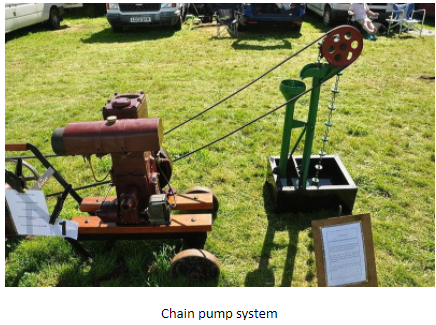
Explain the chain pump system?
Answer
588.6k+ views
Hint: Various irrigation techniques have been evolved to fetch water from deep water bodies and use it for agriculture processes. Many of them have ancient roots as well.
Complete answer:
The chain pump is a carbon steel pump with numerous small circular discs positioned over an endless chain. It also consists of pallets to avoid leakage of water. It increases the efficacy of irrigation. In this method of irrigation, one end of the chain bearing the discs goes inside a pump that is slightly bigger in diameter than that of the discs. The other end bears a bucket and is dipped inside the water source. When the chain is pulled through the pump, water becomes entrapped in between the discs and gets pulled to the top of the tube. It has been used from ancient times, in various parts of Europe, China, and the middle-east. It is used to retrieve water from deep trenches, ditches, and low irrigation canals. It also reduces the labor required to pump water to high croplands and hilly areas.
The time of the invention of the chain pump is still in doubt. However, the first use of a chain pump was seen during 200 B.C. in Egypt, Europe using a gear wheel. It was also recorded in China in the 1st century, A.D., and was described by the Chinese philosopher Wang Chong. They called it ‘dragon backbones'.
Note: There is a vast variety of irrigation techniques such as drip irrigation, surface irrigation, Rahat, dhekli method, central pivot irrigation, sprinkler irrigation, etc. The most efficient method of irrigation is the ‘drip irrigation technique whereas the least efficient is the surface irrigation method.

Complete answer:
The chain pump is a carbon steel pump with numerous small circular discs positioned over an endless chain. It also consists of pallets to avoid leakage of water. It increases the efficacy of irrigation. In this method of irrigation, one end of the chain bearing the discs goes inside a pump that is slightly bigger in diameter than that of the discs. The other end bears a bucket and is dipped inside the water source. When the chain is pulled through the pump, water becomes entrapped in between the discs and gets pulled to the top of the tube. It has been used from ancient times, in various parts of Europe, China, and the middle-east. It is used to retrieve water from deep trenches, ditches, and low irrigation canals. It also reduces the labor required to pump water to high croplands and hilly areas.
The time of the invention of the chain pump is still in doubt. However, the first use of a chain pump was seen during 200 B.C. in Egypt, Europe using a gear wheel. It was also recorded in China in the 1st century, A.D., and was described by the Chinese philosopher Wang Chong. They called it ‘dragon backbones'.
Note: There is a vast variety of irrigation techniques such as drip irrigation, surface irrigation, Rahat, dhekli method, central pivot irrigation, sprinkler irrigation, etc. The most efficient method of irrigation is the ‘drip irrigation technique whereas the least efficient is the surface irrigation method.

Recently Updated Pages
Master Class 8 Social Science: Engaging Questions & Answers for Success

Master Class 8 English: Engaging Questions & Answers for Success

Class 8 Question and Answer - Your Ultimate Solutions Guide

Master Class 8 Maths: Engaging Questions & Answers for Success

Master Class 8 Science: Engaging Questions & Answers for Success

Master Class 9 General Knowledge: Engaging Questions & Answers for Success

Trending doubts
What is BLO What is the full form of BLO class 8 social science CBSE

Citizens of India can vote at the age of A 18 years class 8 social science CBSE

Full form of STD, ISD and PCO

Advantages and disadvantages of science

Right to vote is a AFundamental Right BFundamental class 8 social science CBSE

What are the 12 elements of nature class 8 chemistry CBSE




